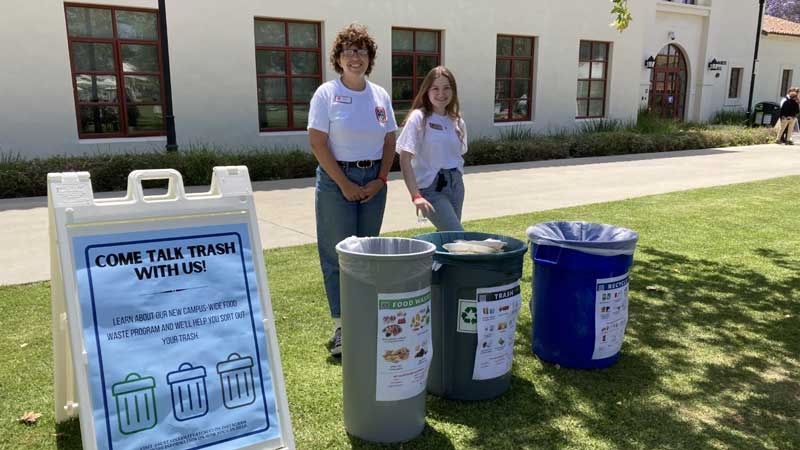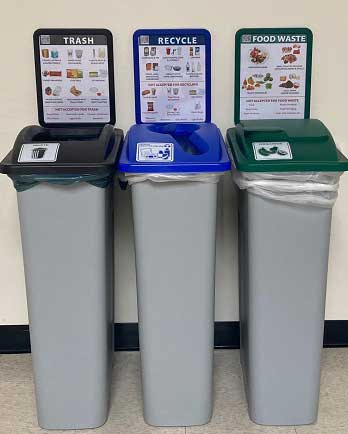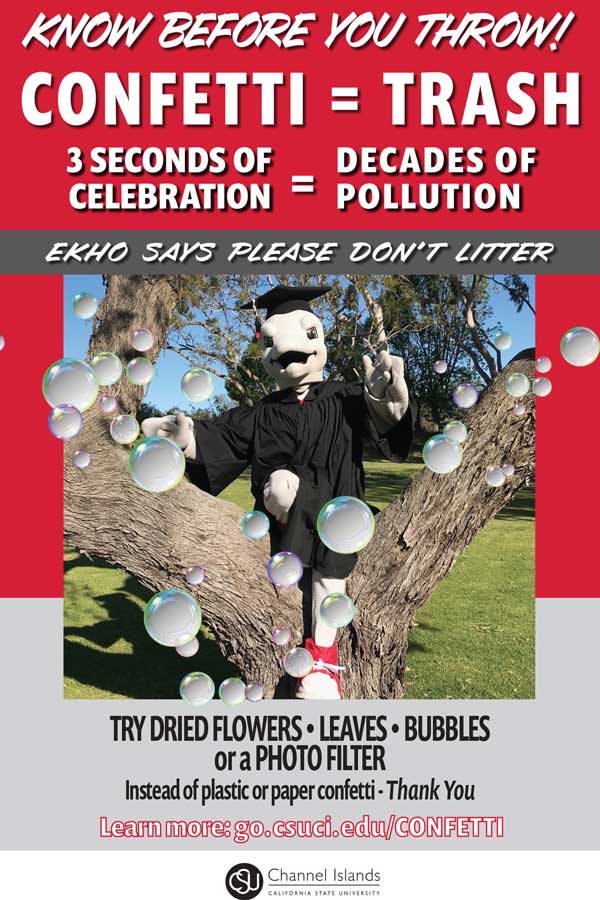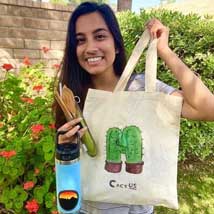
CSU Channel Islands is striving to divert 80% of all campus waste from the landfill by 2040! What does that mean? It means that first we need to reduce how much waste we generate through reuse of materials. Then, 80% of all materials “thrown away” on campus should either be destined for recycling or compost. To achieve this goal, we need all dolphins to do your part to understand our wasteful habits and learn how to properly sort your waste.
Why is it important to divert 80% of our waste? Well, the average Californian throws out 6.4 pounds of trash every day! If everyone on campus created that much trash, we’d be throwing out nearly 50,000 pounds per day. Not only is that waste expensive, but it’s also a poor use of finite resources. Instead, we’re focused on reducing waste, recycling what we can, and composting organic waste to reduce greenhouse gas emissions and support a circular economy. Check out CSUCI’s Annual Sustainability Reports to see our progress toward achieving our goal.

Waste Sorting and Signage
Sorting waste properly at the point of disposal is one of the simplest ways for us to improve recycling rates and reduce landfill waste. To facilitate proper waste sorting, CI has designed signs for each waste stream to identify what materials are accepted and what materials are prohibited.
What can I RECYCLE on campus? (PDF, 462K)
What goes in the TRASH on campus? (PDF, 270K)
What can I COMPOST on campus? (PDF, 742K)
Confetti and Glitter Are Litter

Did you know that confetti and glitter are harmful to the environment? These products, usually made of plastic, are tossed into the air for a moment of fun, but their environmental impact lasts forever. Instead of confetti or glitter, try these eco-friendly alternatives to capture that special moment:
- Dried flowers or herbs
- Bubbles
- Hole-punched leaves
- Digital photo filter
- Chalkboard or letter board
Learn more about the problem with confetti and its history at go.csuci.edu/confetti.
Waste Reduction Tips

- Edit documents on screen; print and copy double-sided.
- Choose reusable over disposables: dishware, silverware, bags for shopping, mugs and water bottles.
- Invest in rechargeable batteries instead of regular ones. This helps reduce the amount of hazardous materials you throw away and can save you money.
- Bring your own coffee mug and dishware.
- Buy food from local sources to reduce the carbon footprint from transport.
- Purchase food in bulk to avoid extra packaging materials, but make sure to use the product before it expires.
- Repurpose existing items – be creative and instill new life into materials you paid for! Rinse out sauce jars instead of buying mason jars, plant seeds in rinsed yogurt cups, shred last semester’s notes for hamster bedding. See materials not as they are, but for what they could be!
- Know what is recyclable and where to take it. Bring electronics to e-waste centers and compost food scraps to make your own soil.
- Avoid non-recyclable packaging, such as thin plastic films.
10 Tips to Reduce Plastic Usage
Did you know, every single piece of plastic ever created still exists! Plastic never fully biodegrades and usually takes around 500 years to break down into microplastics. Here are some tips (via Return to Now) on how to use less of this toxic stuff and help to shape a more sustainable campus, community and society.
- Use cloth/canvas grocery bags. Keep some reusable bags in the car so that you don’t forget them when you go grocery shopping (you’ll also save a few cents!)
- Use a metal water bottle. When you go out of the house, you’ll have no need to buy water in a plastic bottle, and it will keep your water colder.
- Pack lunches in a reusable container. This way, you’re able to avoid using single-use plastic baggies or plastic wrap.
- Skip plastic produce bags. When buying produce, it’s difficult not to tear off the single-use plastic produce bags so that our food doesn’t touch the cart (or each other). If you bring reusable ones from home, you can avoid both of these things in a more sustainable way.
- Just say no to plastic cutlery and straws. Bring a metal or reusable straw and bring metal or wooden cutlery when leaving the house.
- Carry your own cup or mug. When grabbing a coffee from Freudian Sip, make sure you have a cup or mug with you to avoid the plastic use – especially if you buy coffee or other drinks frequently.
- Bring your own container when you go out to eat or get take-out. If you can’t finish your meal or are getting take out, make sure to have a reusable container that the restaurant can put your food into instead of putting it in a single-use container.
- Use glassware for your leftovers. Instead of using tupperware or plastic baggies, store leftover food in glassware (it’s easier to clean, too!)
- Use cloth or paper-based diapers. If you have kids, check out some alternatives for traditional diapers that are either washable or eco-friendly.
- Buy your shampoo and soap in bars. Liquid soap is convenient, but the plastic usage isn’t worth it. It’s just as easy to use hygiene products in bars instead.
